2014 TOYOTA VERSO brake fluid
[x] Cancel search: brake fluidPage 195 of 650
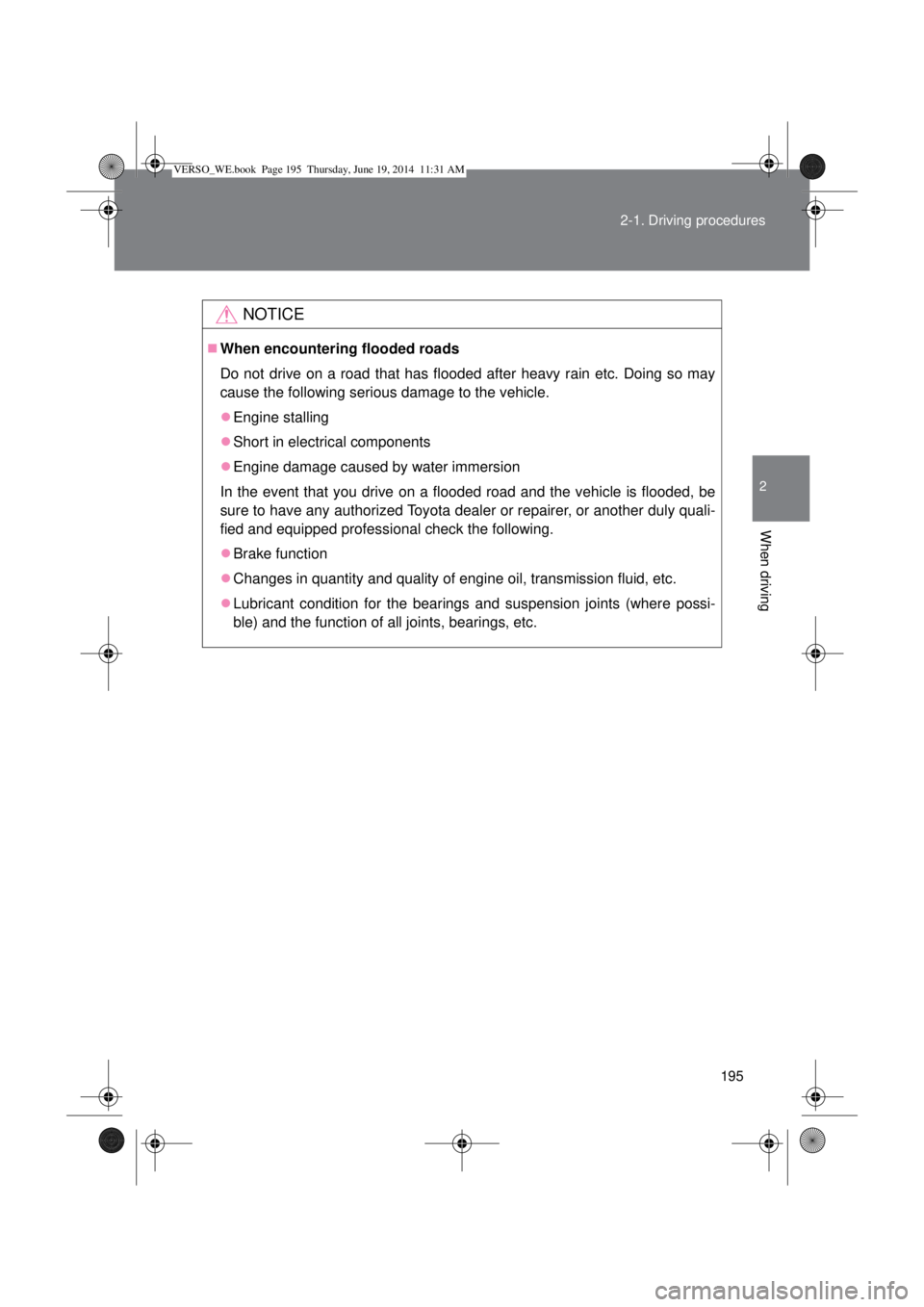
195 2-1. Driving procedures
2
When driving
NOTICE
When encountering flooded roads
Do not drive on a road that has flooded after heavy rain etc. Doing so may
cause the following serious damage to the vehicle.
Engine stalling
Short in electrical components
Engine damage caused by water immersion
In the event that you drive on a flooded road and the vehicle is flooded, be
sure to have any authorized Toyota dealer or repairer, or another duly quali-
fied and equipped professional check the following.
Brake function
Changes in quantity and quality of engine oil, transmission fluid, etc.
Lubricant condition for the bearings and suspension joints (where possi-
ble) and the function of all joints, bearings, etc.
VERSO_WE.book Page 195 Thursday, June 19, 2014 11:31 AM
Page 298 of 650

298
2-5. Driving information
Winter driving tips
Carry out the necessary preparations and inspections before driving
the vehicle in winter. Always drive the vehicle in a manner appropri-
ate to the prevailing weather conditions.
Pre-winter preparations
Use fluids that are appropriate to the prevailing outside tem-
peratures.
• Engine oil
• Engine coolant
• Washer fluid
Have a service technician inspect the condition of the battery.
Have the vehicle fitted with four snow tires or purchase a set
of tire chains for the front tires.
Ensure that all tires are the same size and brand, and that chains
match the size of the tires.
Before driving the vehicle
Perform the following according to the driving conditions:
Do not try to forcibly open a window or move a wiper that is
frozen. Pour warm water over the frozen area to melt the ice.
Wipe away the water immediately to prevent it from freezing.
To ensure proper operation of the climate control system fan,
remove any snow that has accumulated on the air inlet vents
in front of the windshield.
Check for and remove any excess ice or snow that may have
accumulated on the exterior lights, vehicle’s roof, chassis,
around the tires or on the brakes.
Remove any snow or mud from the bottom of your shoes
before getting in the vehicle.
VERSO_WE.book Page 298 Thursday, June 19, 2014 11:31 AM
Page 410 of 650
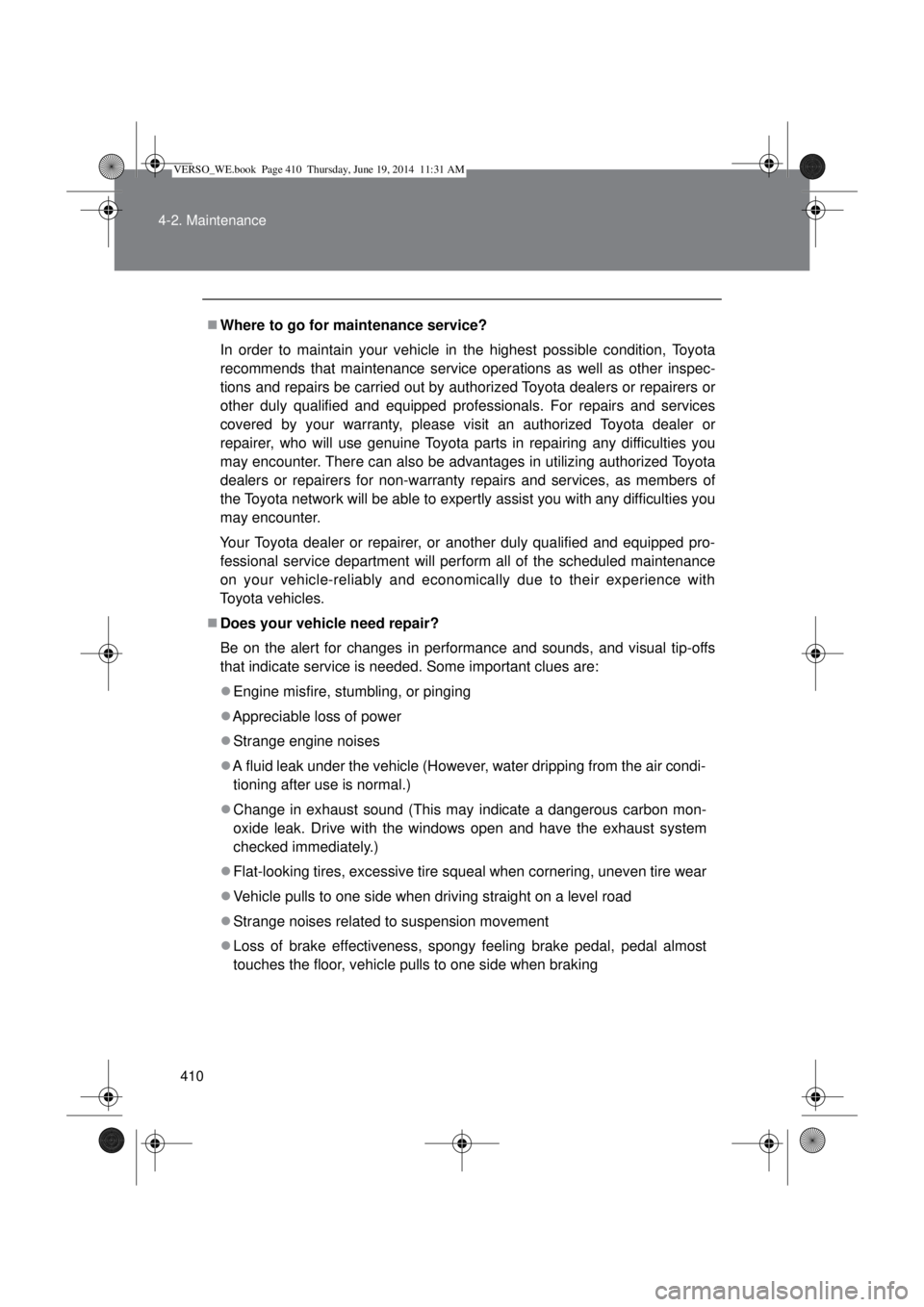
410 4-2. Maintenance
Where to go for maintenance service?
In order to maintain your vehicle in the highest possible condition, Toyota
recommends that maintenance service operations as well as other inspec-
tions and repairs be carried out by authorized Toyota dealers or repairers or
other duly qualified and equipped professionals. For repairs and services
covered by your warranty, please visit an authorized Toyota dealer or
repairer, who will use genuine Toyota parts in repairing any difficulties you
may encounter. There can also be advantages in utilizing authorized Toyota
dealers or repairers for non-warranty repairs and services, as members of
the Toyota network will be able to expertly assist you with any difficulties you
may encounter.
Your Toyota dealer or repairer, or another duly qualified and equipped pro-
fessional service department will perform all of the scheduled maintenance
on your vehicle-reliably and economically due to their experience with
Toyota vehicles.
Does your vehicle need repair?
Be on the alert for changes in performance and sounds, and visual tip-offs
that indicate service is needed. Some important clues are:
Engine misfire, stumbling, or pinging
Appreciable loss of power
Strange engine noises
A fluid leak under the vehicle (However, water dripping from the air condi-
tioning after use is normal.)
Change in exhaust sound (This may indicate a dangerous carbon mon-
oxide leak. Drive with the windows open and have the exhaust system
checked immediately.)
Flat-looking tires, excessive tire squeal when cornering, uneven tire wear
Vehicle pulls to one side when driving straight on a level road
Strange noises related to suspension movement
Loss of brake effectiveness, spongy feeling brake pedal, pedal almost
touches the floor, vehicle pulls to one side when braking
VERSO_WE.book Page 410 Thursday, June 19, 2014 11:31 AM
Page 414 of 650
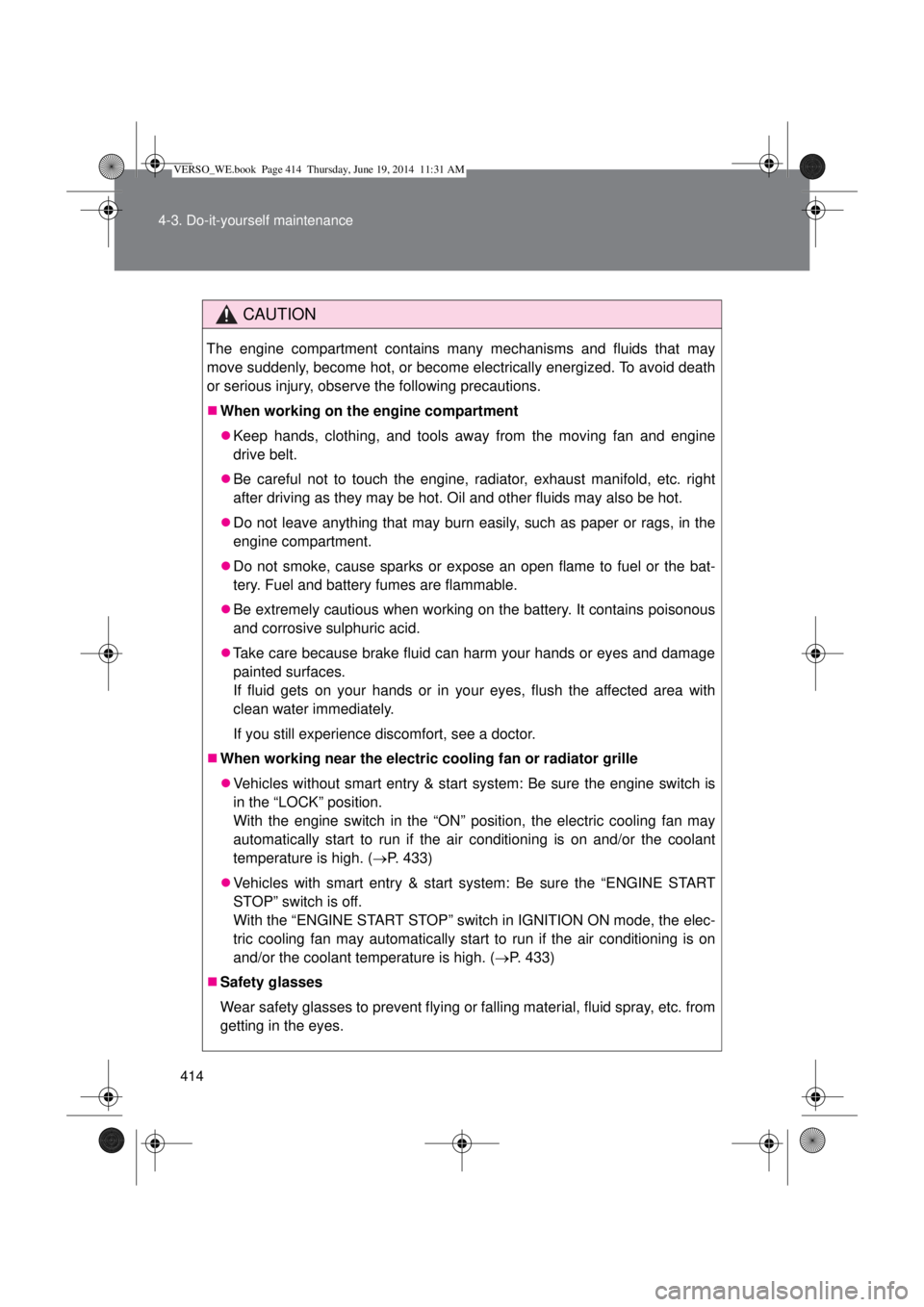
414 4-3. Do-it-yourself maintenance
CAUTION
The engine compartment contains many mechanisms and fluids that may
move suddenly, become hot, or become electrically energized. To avoid death
or serious injury, observe the following precautions.
When working on the engine compartment
Keep hands, clothing, and tools away from the moving fan and engine
drive belt.
Be careful not to touch the engine, radiator, exhaust manifold, etc. right
after driving as they may be hot. Oil and other fluids may also be hot.
Do not leave anything that may burn easily, such as paper or rags, in the
engine compartment.
Do not smoke, cause sparks or expose an open flame to fuel or the bat-
tery. Fuel and battery fumes are flammable.
Be extremely cautious when working on the battery. It contains poisonous
and corrosive sulphuric acid.
Take care because brake fluid can harm your hands or eyes and damage
painted surfaces.
If fluid gets on your hands or in your eyes, flush the affected area with
clean water immediately.
If you still experience discomfort, see a doctor.
When working near the electric cooling fan or radiator grille
Vehicles without smart entry & start system: Be sure the engine switch is
in the “LOCK” position.
With the engine switch in the “ON” position, the electric cooling fan may
automatically start to run if the air conditioning is on and/or the coolant
temperature is high. (P. 433)
Vehicles with smart entry & start system: Be sure the “ENGINE START
STOP” switch is off.
With the “ENGINE START STOP” switch in IGNITION ON mode, the elec-
tric cooling fan may automatically start to run if the air conditioning is on
and/or the coolant temperature is high. (P. 433)
Safety glasses
Wear safety glasses to prevent flying or falling material, fluid spray, etc. from
getting in the eyes.
VERSO_WE.book Page 414 Thursday, June 19, 2014 11:31 AM
Page 415 of 650
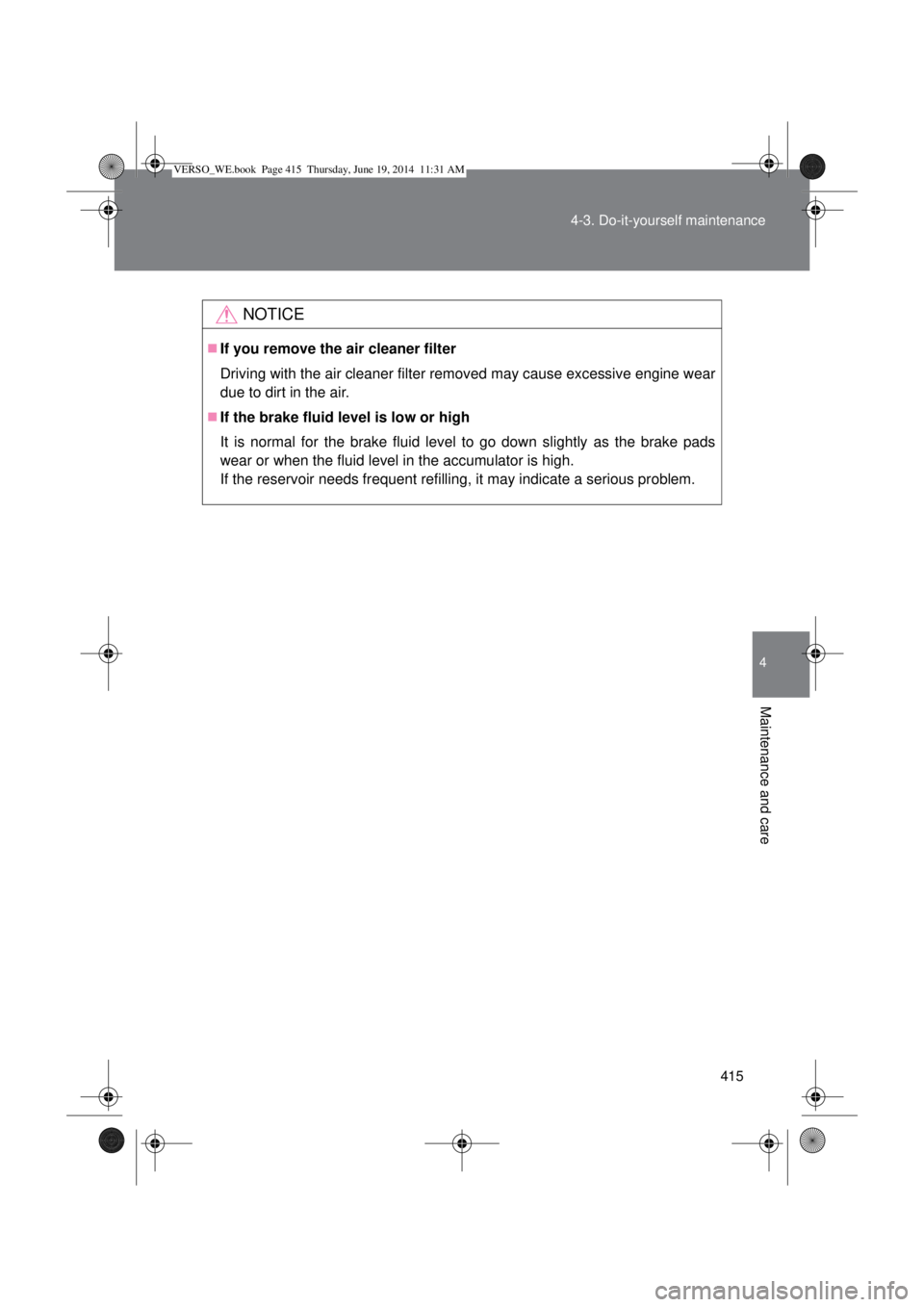
415 4-3. Do-it-yourself maintenance
4
Maintenance and care
NOTICE
If you remove the air cleaner filter
Driving with the air cleaner filter removed may cause excessive engine wear
due to dirt in the air.
If the brake fluid level is low or high
It is normal for the brake fluid level to go down slightly as the brake pads
wear or when the fluid level in the accumulator is high.
If the reservoir needs frequent refilling, it may indicate a serious problem.
VERSO_WE.book Page 415 Thursday, June 19, 2014 11:31 AM
Page 512 of 650
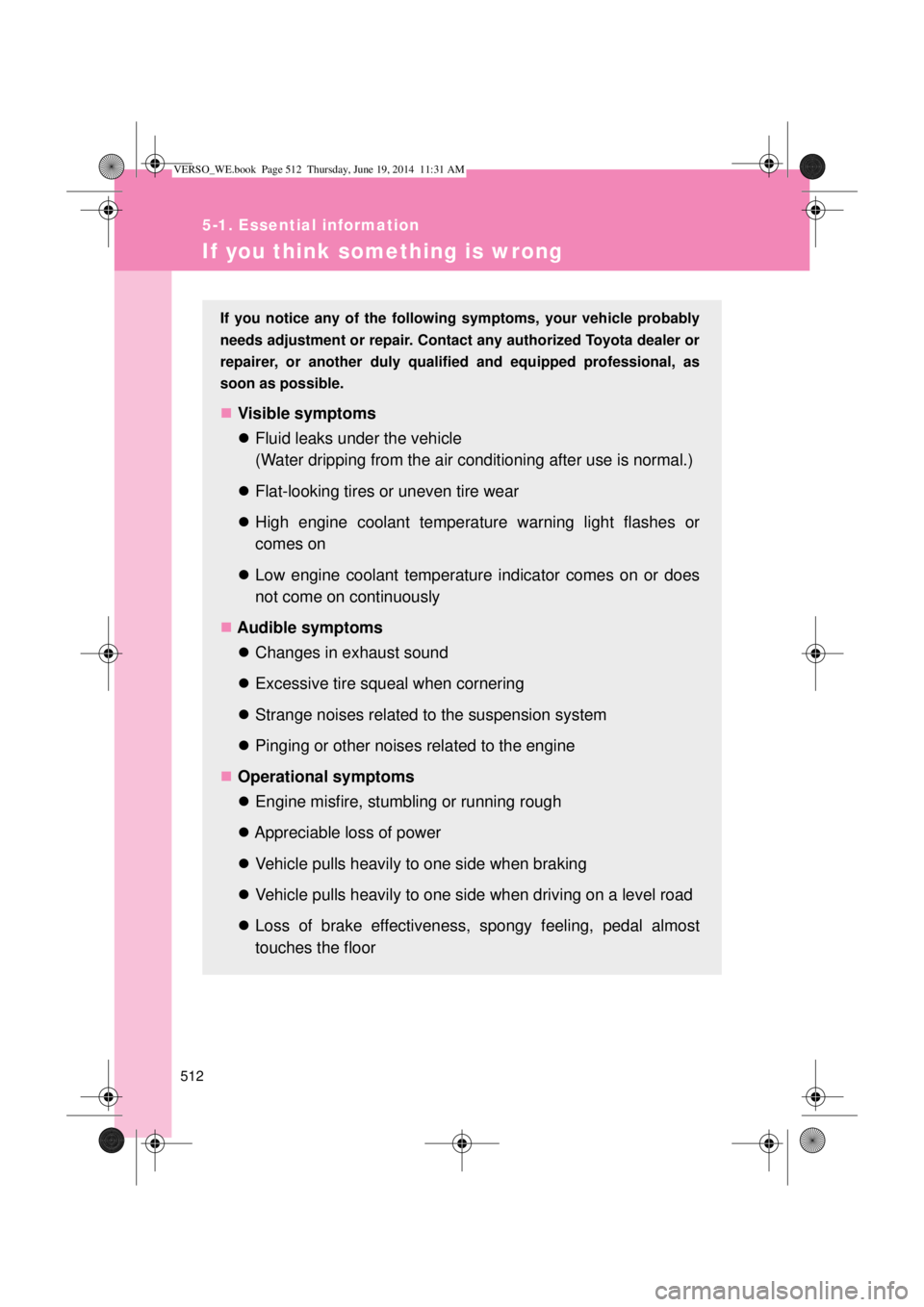
512
5-1. Essential information
If you think something is wrong
If you notice any of the following symptoms, your vehicle probably
needs adjustment or repair. Contact any authorized Toyota dealer or
repairer, or another duly qualified and equipped professional, as
soon as possible.
Visible symptoms
Fluid leaks under the vehicle
(Water dripping from the air conditioning after use is normal.)
Flat-looking tires or uneven tire wear
High engine coolant temperature warning light flashes or
comes on
Low engine coolant temperature indicator comes on or does
not come on continuously
Audible symptoms
Changes in exhaust sound
Excessive tire squeal when cornering
Strange noises related to the suspension system
Pinging or other noises related to the engine
Operational symptoms
Engine misfire, stumbling or running rough
Appreciable loss of power
Vehicle pulls heavily to one side when braking
Vehicle pulls heavily to one side when driving on a level road
Loss of brake effectiveness, spongy feeling, pedal almost
touches the floor
VERSO_WE.book Page 512 Thursday, June 19, 2014 11:31 AM
Page 514 of 650
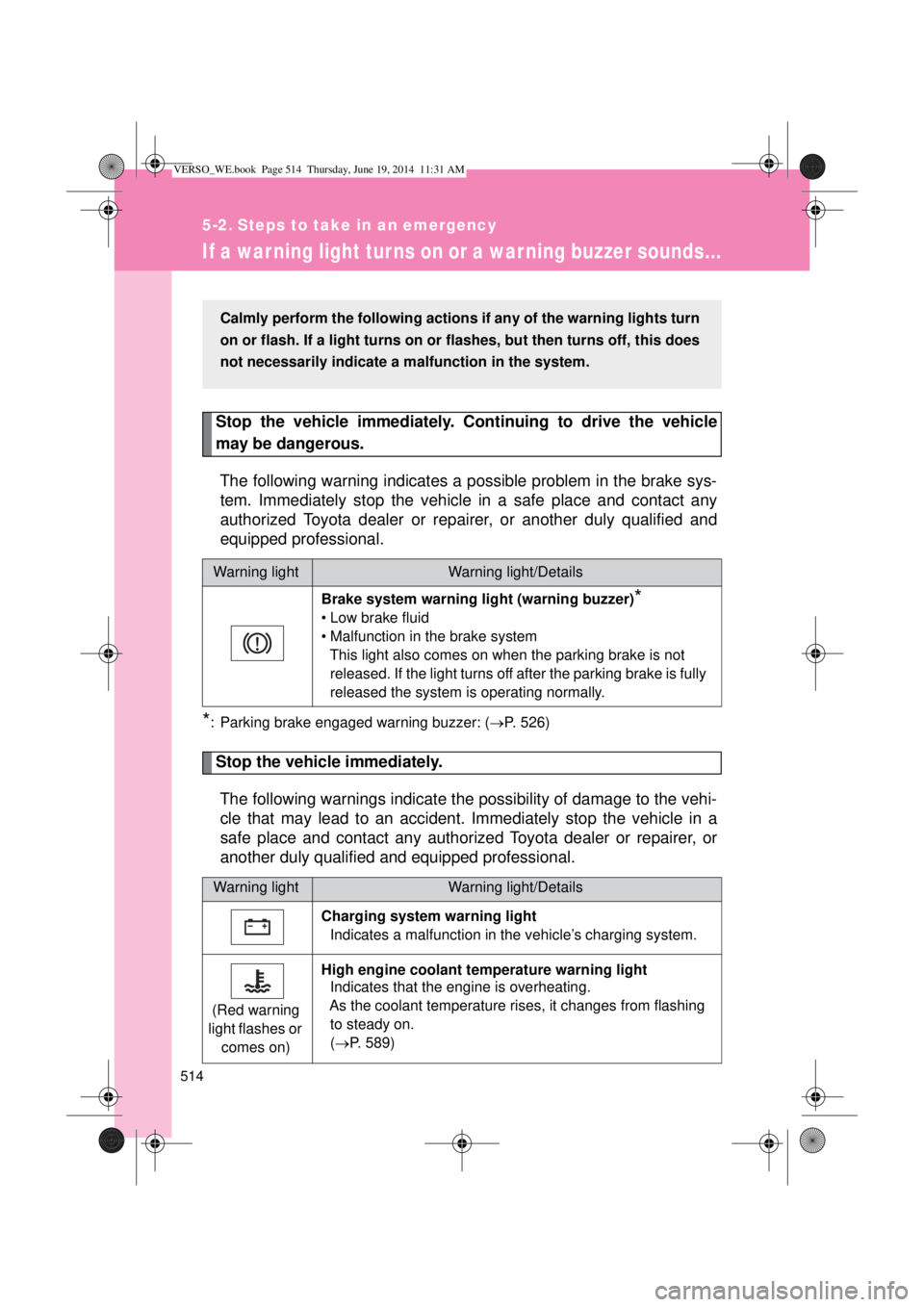
514
5-2. Steps to take in an emergency
If a warning light turns on or a warning buzzer sounds...
Stop the vehicle immediately. Continuing to drive the vehicle
may be dangerous.
The following warning indicates a possible problem in the brake sys-
tem. Immediately stop the vehicle in a safe place and contact any
authorized Toyota dealer or repairer, or another duly qualified and
equipped professional.
*: Parking brake engaged warning buzzer: (P. 526)
Stop the vehicle immediately.
The following warnings indicate the possibility of damage to the vehi-
cle that may lead to an accident. Immediately stop the vehicle in a
safe place and contact any authorized Toyota dealer or repairer, or
another duly qualified and equipped professional.
Warning lightWarning light/Details
Brake system warning light (warning buzzer)
*
• Low brake fluid
• Malfunction in the brake system
This light also comes on when the parking brake is not
released. If the light turns off after the parking brake is fully
released the system is operating normally.
Warning lightWarning light/Details
Charging system warning light
Indicates a malfunction in the vehicle’s charging system.
(Red warning
light flashes or
comes on)High engine coolant temperature warning light
Indicates that the engine is overheating.
As the coolant temperature rises, it changes from flashing
to steady on.
(P. 589)
Calmly perform the following actions if any of the warning lights turn
on or flash. If a light turns on or flashes, but then turns off, this does
not necessarily indicate a malfunction in the system.
VERSO_WE.book Page 514 Thursday, June 19, 2014 11:31 AM
Page 527 of 650
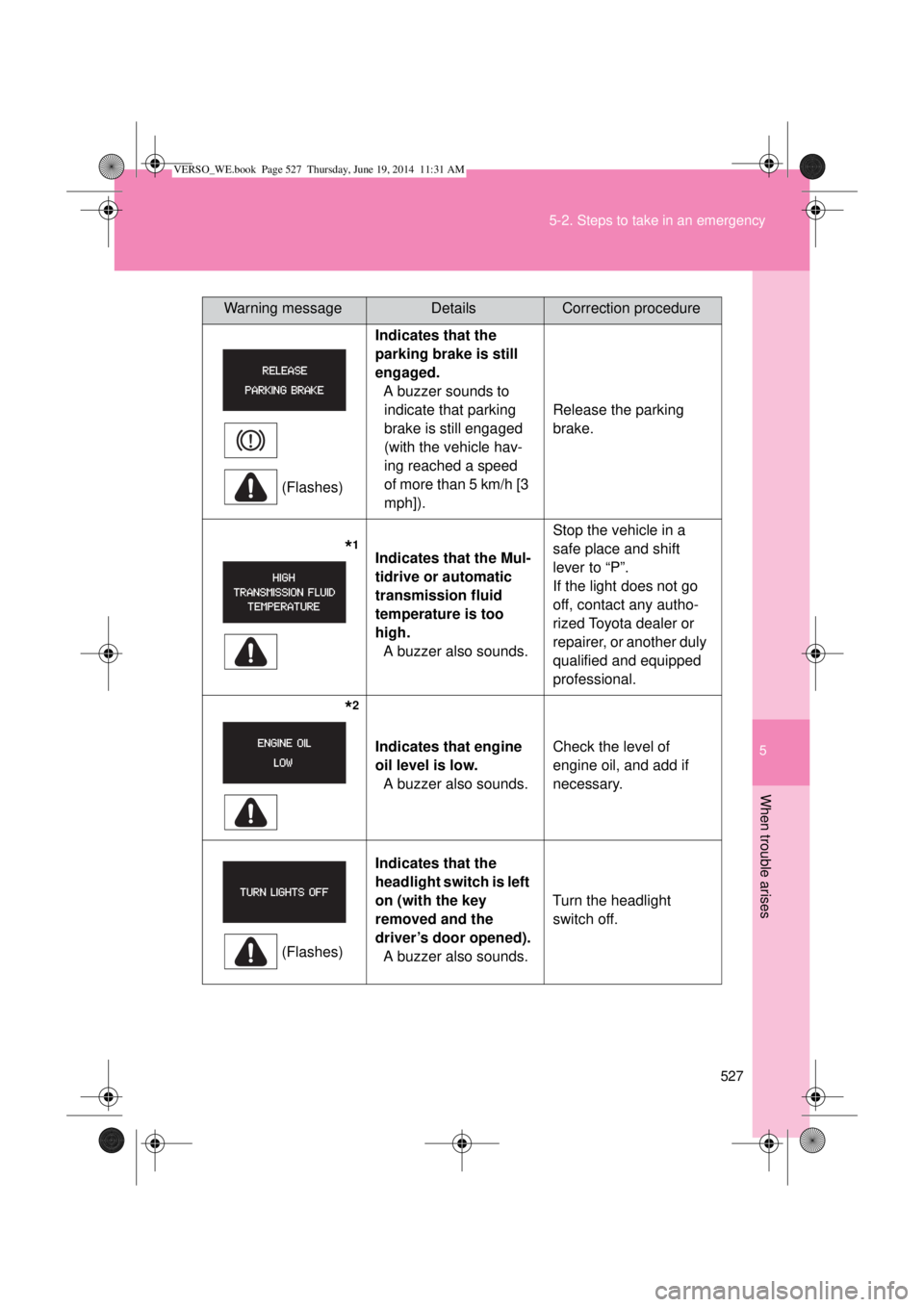
5
527 5-2. Steps to take in an emergency
When trouble arises
(Flashes)Indicates that the
parking brake is still
engaged.
A buzzer sounds to
indicate that parking
brake is still engaged
(with the vehicle hav-
ing reached a speed
of more than 5 km/h [3
mph]).Release the parking
brake.
*1Indicates that the Mul-
tidrive or automatic
transmission fluid
temperature is too
high.
A buzzer also sounds.Stop the vehicle in a
safe place and shift
lever to “P”.
If the light does not go
off, contact any autho-
rized Toyota dealer or
repairer, or another duly
qualified and equipped
professional.
*2
Indicates that engine
oil level is low.
A buzzer also sounds.Check the level of
engine oil, and add if
necessary.
(Flashes)Indicates that the
headlight switch is left
on (with the key
removed and the
driver’s door opened).
A buzzer also sounds.Turn the headlight
switch off.
Warning messageDetailsCorrection procedure
VERSO_WE.book Page 527 Thursday, June 19, 2014 11:31 AM